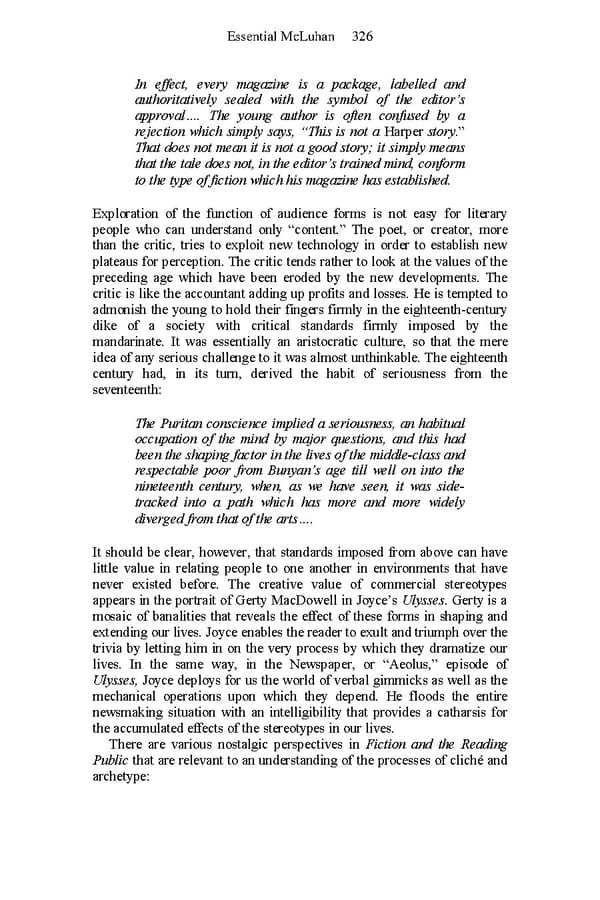Essential McLuhan 326 In effect, every magazine is a package, labelled and authoritatively sealed with the symbol of the editor’s approval…. The young author is often confused by a rejection which simply says, “This is not a Harper story.” That does not mean it is not a good story; it simply means that the tale does not, in the editor’s trained mind, conform to the type of fiction which his magazine has established. Exploration of the function of audience forms is not easy for literary people who can understand only “content.” The poet, or creator, more than the critic, tries to exploit new technology in order to establish new plateaus for perception. The critic tends rather to look at the values of the preceding age which have been eroded by the new developments. The critic is like the accountant adding up profits and losses. He is tempted to admonish the young to hold their fingers firmly in the eighteenth-century dike of a society with critical standards firmly imposed by the mandarinate. It was essentially an aristocratic culture, so that the mere idea of any serious challenge to it was almost unthinkable. The eighteenth century had, in its turn, derived the habit of seriousness from the seventeenth: The Puritan conscience implied a seriousness, an habitual occupation of the mind by major questions, and this had been the shaping factor in the lives of the middle-class and respectable poor from Bunyan’s age till well on into the nineteenth century, when, as we have seen, it was side- tracked into a path which has more and more widely diverged from that of the arts…. It should be clear, however, that standards imposed from above can have little value in relating people to one another in environments that have never existed before. The creative value of commercial stereotypes appears in the portrait of Gerty MacDowell in Joyce’s Ulysses. Gerty is a mosaic of banalities that reveals the effect of these forms in shaping and extending our lives. Joyce enables the reader to exult and triumph over the trivia by letting him in on the very process by which they dramatize our lives. In the same way, in the Newspaper, or “Aeolus,” episode of Ulysses, Joyce deploys for us the world of verbal gimmicks as well as the mechanical operations upon which they depend. He floods the entire newsmaking situation with an intelligibility that provides a catharsis for the accumulated effects of the stereotypes in our lives. There are various nostalgic perspectives in Fiction and the Reading Public that are relevant to an understanding of the processes of cliché and archetype:
 Essential McLuhan Page 332 Page 334
Essential McLuhan Page 332 Page 334